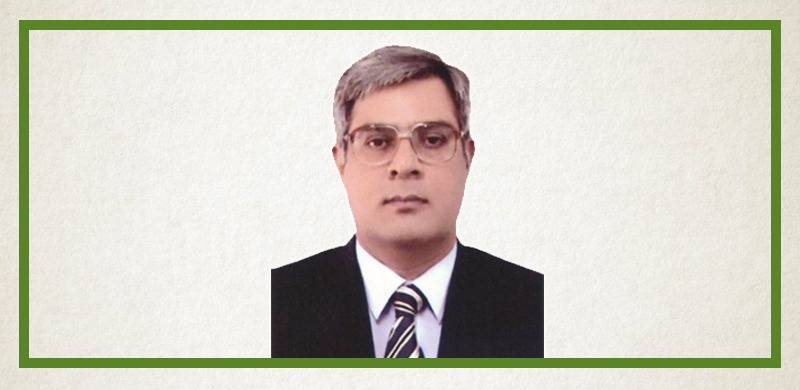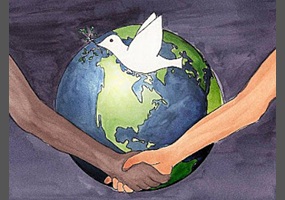
There are two opposite views whether world peace, narrowly defined as absence of warfare, is a norm while war is an aberration. Dr Margaret MacMillan, Professor of International History at Oxford and author of The War That Ended Peace, does not believe that war is an aberration, and peace is the norm.
Rather, she iterates, war is deeply woven into our history as empires rise by defeating lesser powers and decline, leaving others to pick on the carcass. Fear is a motivator to war, as is the distinction between honour and shame, passed down from generation to generation. And the part played by individuals should never be discounted: wars break out as a result of thousands of human judgements and misjudgements.
On the other hand, Steven Pinker believes that it is completely conceivable that wars between countries might go the way of slave auctions, debtors’ prisons and other barbaric customs. Not only, is war is at an all-time low, rates of homicide are far lower than they were in the Middle Ages, and issues like domestic violence are no longer seen as being acceptable.
I tend to agree with the latter view; to me the world peace is default function of the global political system politics; warfare is its occasional malfunctioning for the following reasons.

Firstly, declining warfare is an historical trend. If we look at the world history, the frequency and duration of warfare is decreasing. Compare 100 Years War or Thirty Years War with 1st or 2nd World War or even Afghanistan war.
Steven Pinker rightly argues that while there is plenty of violence around the world, and more ways of killing each other, we have witnessed fewer and fewer wars between countries since 1945. War & Peace section of the website Our World in Data contains in-depth analysis of the wars conducted among the great powers during the last 500 years.
Secondly, related to above, the inexorable march of history, from villages to towns and city-states to nation-states, the trend is slow but steady journey towards bigger units of administration eliminating warfare within that entity. The formation of World Government is the end point of this march of history.
Within next two centuries, all the current state borders will be abolished, and nation-states will be replaced by continent-size units of governance, with maximum devolution/decentralisation for provision of basic services to the people. While UNO will act as the world Parliament to formulate global policies, its constituent units such as UNICEF, WHO etc will be acting like global ministries with the World Bank as the central bank English will be recognised as the universal language with inputs from different languages towards its vocabulary.
Thirdly, feminization of policy formulation. With the gradual entry of females in the higher echelons of power all over the world, the world is becoming more humane and peace loving. Even a country like Pakistan has 20% female representation in its legislatures while it is more than 50% in more than 20 countries including African countries. Over the next few decades, there will be large number of women heads of states/governments not only in Europe and North America but also in other parts of the world. With few exceptions(i.e Margaret Thatcher), women tend to be more peace loving than their male counterparts.
Fourthly, the Decline of the USA. In modern era, USA is the worst offender, responsible for causing more than 20 million deaths through its overt and covert operations since the end of 2nd World War. With its inevitable decline and rise of China which firmly believes in its “peaceful rise”. China as a super power with more concern with economic development (OBOR), a catalyst for global peace, it will be a better, a more peaceful world thriving economically in a peaceful environment . Settling a number of border disputes, strengthening ties with regional organizations, and expanding global trade and investment relationships through its multi-billion dollar Belt and Road Initiative are some of the pointers towards this trend.
Fifth, economic globalization. Globalization has completely altered the way nations govern, communicate, negotiate, and interact with each other. It has improved and expanded global commerce, brought more Foreign Direct Investment (FDI) in developing countries, built infrastructure, advanced literacy, inspired democratic movements via social networks, and created emerging middle classes all over the world. These middle classes are by tradition anti-war and pro-peace for expansion of trade, investment and greater prosperity.

Sixth, Social Globalization. Side by side with the economic globalization, there is multiplication of social networks and activities that increasingly overcome traditional political, economic, cultural and geographical boundaries. Expansion and stretching of social activities and interdependencies are resulting in intensification and acceleration of social exchanges and activities through information technology. The world is literally becoming a global village with chances of warfare diminishing.
Seventhly, Balance of Power. Throughout history balance of power between the contenders of global hegemony has been the most effective to ensure peace with occasional outbreaks of wars. This has been augmented with the development of nuclear weapons; no one is interested to start a war which may result in Mutual Assured Destruction(MAD). Full-scale use of nuclear weapons by two opposing sides would effectively result in the destruction of both belligerents, which no longer offers the possibility of a net gain for either side, thereby making wars pointless.
https://www.youtube.com/watch?v=aL3A1MTABso
The International Day of Peace, sometimes called World Peace Day, is observed on September 21.
Rather, she iterates, war is deeply woven into our history as empires rise by defeating lesser powers and decline, leaving others to pick on the carcass. Fear is a motivator to war, as is the distinction between honour and shame, passed down from generation to generation. And the part played by individuals should never be discounted: wars break out as a result of thousands of human judgements and misjudgements.
On the other hand, Steven Pinker believes that it is completely conceivable that wars between countries might go the way of slave auctions, debtors’ prisons and other barbaric customs. Not only, is war is at an all-time low, rates of homicide are far lower than they were in the Middle Ages, and issues like domestic violence are no longer seen as being acceptable.
I tend to agree with the latter view; to me the world peace is default function of the global political system politics; warfare is its occasional malfunctioning for the following reasons.

Firstly, declining warfare is an historical trend. If we look at the world history, the frequency and duration of warfare is decreasing. Compare 100 Years War or Thirty Years War with 1st or 2nd World War or even Afghanistan war.
Steven Pinker rightly argues that while there is plenty of violence around the world, and more ways of killing each other, we have witnessed fewer and fewer wars between countries since 1945. War & Peace section of the website Our World in Data contains in-depth analysis of the wars conducted among the great powers during the last 500 years.
Secondly, related to above, the inexorable march of history, from villages to towns and city-states to nation-states, the trend is slow but steady journey towards bigger units of administration eliminating warfare within that entity. The formation of World Government is the end point of this march of history.
Within next two centuries, all the current state borders will be abolished, and nation-states will be replaced by continent-size units of governance, with maximum devolution/decentralisation for provision of basic services to the people. While UNO will act as the world Parliament to formulate global policies, its constituent units such as UNICEF, WHO etc will be acting like global ministries with the World Bank as the central bank English will be recognised as the universal language with inputs from different languages towards its vocabulary.
Thirdly, feminization of policy formulation. With the gradual entry of females in the higher echelons of power all over the world, the world is becoming more humane and peace loving. Even a country like Pakistan has 20% female representation in its legislatures while it is more than 50% in more than 20 countries including African countries. Over the next few decades, there will be large number of women heads of states/governments not only in Europe and North America but also in other parts of the world. With few exceptions(i.e Margaret Thatcher), women tend to be more peace loving than their male counterparts.
Fourthly, the Decline of the USA. In modern era, USA is the worst offender, responsible for causing more than 20 million deaths through its overt and covert operations since the end of 2nd World War. With its inevitable decline and rise of China which firmly believes in its “peaceful rise”. China as a super power with more concern with economic development (OBOR), a catalyst for global peace, it will be a better, a more peaceful world thriving economically in a peaceful environment . Settling a number of border disputes, strengthening ties with regional organizations, and expanding global trade and investment relationships through its multi-billion dollar Belt and Road Initiative are some of the pointers towards this trend.
Fifth, economic globalization. Globalization has completely altered the way nations govern, communicate, negotiate, and interact with each other. It has improved and expanded global commerce, brought more Foreign Direct Investment (FDI) in developing countries, built infrastructure, advanced literacy, inspired democratic movements via social networks, and created emerging middle classes all over the world. These middle classes are by tradition anti-war and pro-peace for expansion of trade, investment and greater prosperity.

Sixth, Social Globalization. Side by side with the economic globalization, there is multiplication of social networks and activities that increasingly overcome traditional political, economic, cultural and geographical boundaries. Expansion and stretching of social activities and interdependencies are resulting in intensification and acceleration of social exchanges and activities through information technology. The world is literally becoming a global village with chances of warfare diminishing.
Seventhly, Balance of Power. Throughout history balance of power between the contenders of global hegemony has been the most effective to ensure peace with occasional outbreaks of wars. This has been augmented with the development of nuclear weapons; no one is interested to start a war which may result in Mutual Assured Destruction(MAD). Full-scale use of nuclear weapons by two opposing sides would effectively result in the destruction of both belligerents, which no longer offers the possibility of a net gain for either side, thereby making wars pointless.
https://www.youtube.com/watch?v=aL3A1MTABso
The International Day of Peace, sometimes called World Peace Day, is observed on September 21.
